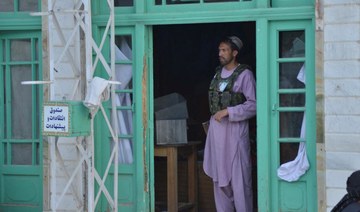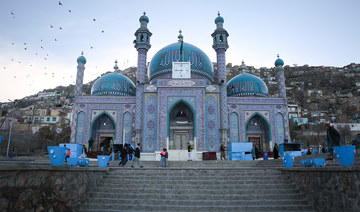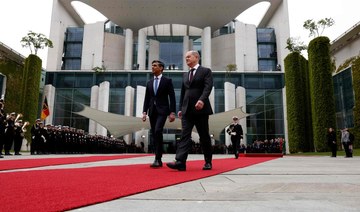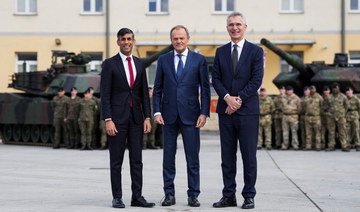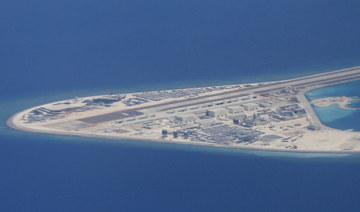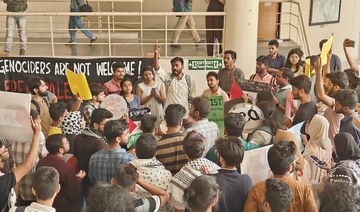REYKJAVIK, Iceland: Top diplomats from the United States and Russia sparred politely in Iceland on Wednesday in their first face-to-face encounter, which came as ties between the nations have deteriorated sharply in recent months.
US Secretary of State Antony Blinken and Russia’s longtime Foreign Minister Sergey Lavrov spoke frankly but calmly of their differences as they held talks on the sidelines of an Arctic Council meeting in the Icelandic capital of Reykjavik, a city with deep history in US-Russian relations.
“We seek a predictable, stable relationship with Russia,” Blinken told Lavrov, echoing comments made by President Joe Biden, who has proposed a summit with Russian leader Vladimir Putin next month. “We think that’s good for our people, good for Russian people and indeed good for the world.”
“It’s also no secret that we have our differences and when it comes to those differences, as President Biden has also shared with President Putin, if Russia acts aggressively against us, our partners, and our allies, we’ll respond — and President Biden has demonstrated that in both word and deed, not for purposes of escalation, not to seek out conflict, but to defend our interests,” Blinken said.
The meeting took place just as the Biden administration notified Congress of new sanctions on Russia over a controversial European pipeline. The administration hit eight Russian companies and vessels with penalties for their involvement in the Nord Stream 2 pipeline, while sparing two German entities from similar penalties.
“We have serious differences in the assessment of the international situation, we have serious differences in the approaches to the tasks which have to be solved for its normalization,” Lavrov said. “Our position is very simple: We are ready to discuss all the issues without exception, but under perception that the discussion will be honest, with the facts on the table, and of course on the basis of mutual respect.”
Even before Wednesday’s talks the two diplomats had laid down near diametrically opposed positions for the meeting, previewing what was likely to be a difficult and contentious exchange over myriad issues including Ukraine, the Arctic, Russia’s treatment of opposition figure Alexey Navalny and accusations of cyber malfeasance, including claims that Russia-based hackers were responsible for a ransomware attack on a key US pipeline.
The meeting also followed a spate of tit-for-tat diplomatic expulsions as US-Russian relations threaten a return to Cold War lows.
Perhaps anticipating Blinken’s position and the expected sanctions announcement, Lavrov had offered a prebuttal at a news conference Monday in Moscow.
“Apparently, a (US) decision was made to promote stable, predictable relations with Russia,” he said. “However, if this includes constant and predictable sanctions, that’s not what we need.”
Blinken said his meeting with Lavrov would be an important opportunity to test the proposition that the US and Russia can work collaboratively on certain issues, like climate change, the Mideast, Iran and North Korea, despite bitter disagreements on others. The meeting comes as much of the world is focused on the Israel-Palestinian war.
Blinken noted that despite the vitriol, the US and Russia had agreed early in the Biden administration to a five-year extension of a key arms control pact that President Donald Trump had declined to renew before he left office. Trump left a decidedly mixed legacy on Russia that included a friendly personal relationship with Putin, while his administration still imposed sanctions and other punitive measures.
Another, more immediate area of disagreement in Reykjavik, the site of the famous 1986 summit between President Ronald Reagan and Russian leader Mikhail Gorbachev, is the Arctic, where Russia has been expanding its military presence and pursuing policies to expand its influence, to the alarm of the Americans.
Blinken noted that the US and Russia have cooperated in the past on Arctic issues, although he glossed over deep American opposition to Russia’s increased military activity in the area and its proposal to renew a long-suspended military dialogue within the eight-nation Arctic Council.
Blinken rejected Russian calls to resume a military component of the Arctic Council and expressed concerns about Russia’s increasing military activity in the region known as the “high North.” On Wednesday, in successive meetings with foreign ministers from other Nordic Council members, Blinken repeatedly referred to the importance of “continuing to maintain this region as one of peaceful cooperation.”
“We have concerns about some of the recent military activities in the Arctic,” he said. “That Increases the dangers of accidents and miscalculations and undermines the shared goal of a peaceful and sustainable future for the region.”
Blinken also took Russia to task for proposing new navigational regulations for the region and decried Lavrov for comments in which he dismissed such criticism because the Arctic “is our territory, our land.”
“We have to proceed all of us, including Russia, based on the rules, based on norms, based on the commitments that we’ve each made and also avoid statements that undercut those,” Blinken said.
In his comments Monday, Lavrov noted the grievances about Russia’s military activities in the Arctic. “It has long been common knowledge that this is our territory, our land. We are in charge of keeping the Arctic coast safe. Everything Russia is doing there is absolutely legal,” he said.
Moscow and Washington are also embroiled in a bitter dispute over the status of their respective embassies and consulates after the diplomatic expulsions. Russia has given the US until Aug. 1 to get rid of all non-American staff at its diplomatic missions, something the US says will make it nearly impossible for its facilities to function.
Top US, Russia diplomats spar firmly but politely in Iceland
https://arab.news/935br
Top US, Russia diplomats spar firmly but politely in Iceland
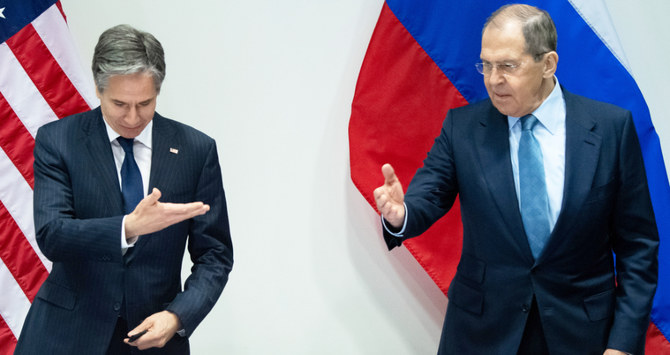
- Blinken said his meeting with Lavrov would be an important opportunity to test the proposition that the US and Russia can work collaboratively on certain issues, like climate change, the Mideast and Iran
Daesh claims gun attack killing six in Afghan mosque
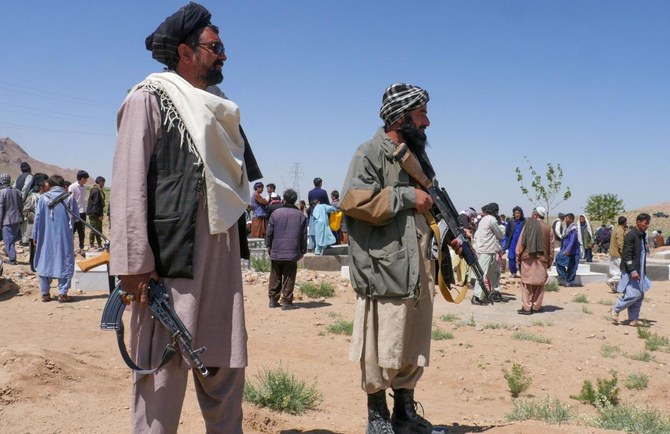
- Daesh said numerous gunmen had stormed the mosque with machine guns
HERAT: The Daesh group has claimed a gun attack on a minority Shiite mosque in western Afghanistan that killed six people on Monday.
Interior ministry spokesman Abdul Mateen Qani said Tuesday morning that “an unknown armed person shot at civilian worshippers in a mosque” in Herat province’s Guzara district at around 9:00 p.m. (1630 GMT) the previous night.
“Six civilians were martyred and one civilian was injured,” he wrote on social media platform X.
Late Tuesday, the regional chapter of Daesh group claimed responsibility and said numerous gunmen had stormed the mosque with machine guns — contradicting the official account of a single assailant.
Locals said the mosque, located just south of provincial capital Herat, served the minority Shiite community and that an imam and a three-year-old child were among those killed.
They said a team of three gunmen had staged the attack.
“One of them was outside and two of them came inside the mosque, shooting the worshippers,” said 60-year-old Ibrahim Akhlaqi, the brother of the slain imam. “It was in the middle of prayers.”
“Whoever was in the mosque has either been martyred or wounded,” added 23-year-old Sayed Murtaza Hussaini.
Taliban authorities have frequently given death tolls lower than other sources after bombings and gun attacks, or otherwise downplayed them, in an apparent attempt to minimize security threats.
Daesh in Afghanistan
The regional chapter of Daesh is the largest security threat in Afghanistan and has frequently targeted Shiite communities.
The Taliban government has pledged to protect religious and ethnic minorities since returning to power in August 2021, but rights monitors say they’ve done little to make good on that promise.
The most notorious attack linked to Daesh since the Taliban takeover was in 2022, when at least 53 people — including 46 girls and young women — were slain in the suicide bombing of an education center.
Taliban officials blamed Daesh for the attack, which happened in a Shiite neighborhood of the capital Kabul.
Afghanistan’s new rulers claim to have ousted IS from the country and are highly sensitive to suggestions the group has found safe haven there since the withdrawal of foreign forces.
A United Nations Security Council report released in January said there had been a decrease in Daesh attacks in Afghanistan because of “counter-terrorism efforts by the Taliban.”
But the report said Daesh still had “substantial” recruitment in the country and that the militant group had “the ability to project a threat into the region and beyond.”
The Daesh chapter spanning Afghanistan, Pakistan and Central Asia claimed responsibility for the March attack on the Crocus City Hall concert venue in Moscow, killing more than 140 people.
It was the deadliest attack in Russia in two decades.
UK local polls could determine PM Sunak’s fate
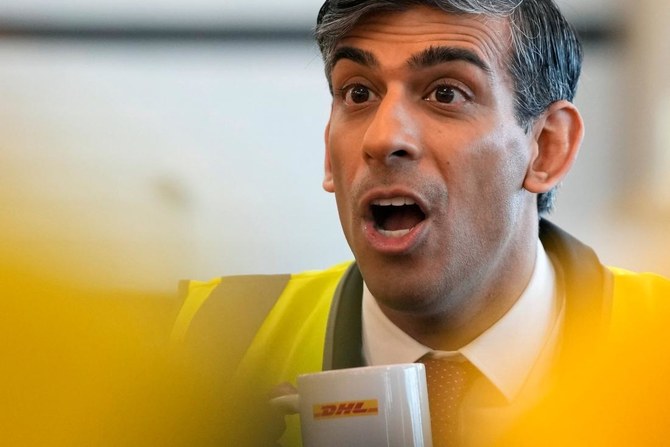
- The polls are the last major electoral test before a general election that Sunak’s party, in power since 2010, seems destined to lose to the Labour opposition
London: Britain’s ruling Conservative party is expected to suffer heavy losses in crunch local elections this week that are likely to increase pressure on beleaguered Prime Minister Rishi Sunak.
The polls are the last major electoral test before a general election that Sunak’s party, in power since 2010, seems destined to lose to the Labour opposition.
Sunak has said he wants to hold the nationwide vote in the second half of the year, but bruising defeats in Thursday’s votes could force his hand earlier.
“These elections form a vital examination for the Sunak premiership — road-testing its claim that the plan is working and the degree to which voters still lend that notion any degree of credibility,” political scientist Richard Carr told AFP.
Incumbent governments tend to suffer losses in local contests and the Conservatives are forecast by pollsters to lose about half of the council seats they are defending.
Sunak’s immediate political future is said to rest on whether two high-profile Tory regional mayors get re-elected in the West Midlands and Tees Valley areas of central and northeast England.
Wins for the Conservative mayors, Andy Street and Ben Houchen, would boost hopes among Tory MPs that Sunak can turn around their party’s fortunes in time for the general election.
But speculation is rife in the UK parliament that a bad showing could lead some restive Conservative lawmakers to try to replace Sunak before the nationwide poll.
“If Andy Street and Ben Houchen both lose, any idea that Sunak can carry on is surely done,” said Carr, a politics lecturer at Anglia Ruskin University.
“Whether that means he rolls the dice on a general election or gets toppled remains to be seen.”
Factional infighting has plagued the Tories in recent years, serving up five prime ministers since the 2016 Brexit vote, including three in four months from July to October 2022.
A group of restive Conservative MPs have drawn up a “policy blitz” for a potential successor to Sunak in the event of massive losses this week, British media have reported.
Some observers say it would be madness for the Conservatives to topple another leader when Sunak has provided some stability since succeeding Liz Truss in October 2022.
Others say the party’s credibility is already shot so why not try one last desperate throw of the dice to try to stop a predicted Labour landslide.
Some 52 MPs would need to submit letters of no confidence in Sunak to trigger an internal party vote to replace him — a tall ask.
“I still expect Sunak will lead the Conservatives into the general election,” Richard Hayton, a politics professor at Leeds University, told AFP.
“But some MPs may seek to move against him, which will further damage his standing with the general public.”
Sunak, 43, was an internal Tory appointment following Truss’s disastrous 49 days premiership in which her unfunded tax cuts caused market turmoil and sank the pound.
Despite numerous leadership resets under Sunak, the Tories have continued to trail Labour, led by Keir Starmer, by double digits in most opinion polls.
An Ipsos poll earlier this month put Sunak’s satisfaction rating at a joint all-time low of minus 59 percent.
More than 2,500 councillors are standing in England on Thursday, as well as London’s Labour mayor Sadiq Khan who is seeking a record third term in office.
Most of the council seats up for re-election were last contested in 2021, when ex-Tory premier Boris Johnson was popular as he rolled out Covid-19 vaccines.
UN Human Rights Chief troubled by ‘heavy-handed’ action against protesters at US colleges
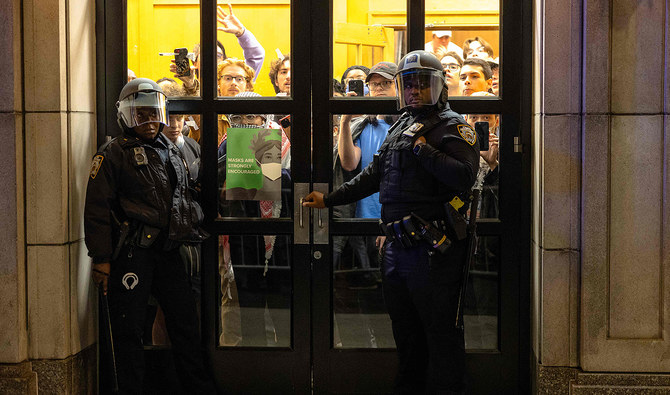
- Volker Turk says ‘freedom of expression and the right to peaceful assembly are fundamental to society, particularly when there is sharp disagreement on major issues’
- Protests have taken place on campuses in several states as students demand colleges withdraw investments from businesses involved in Israel’s assault on Gaza
NEW YORK CITY: The UN’s high commissioner for human rights on Tuesday said he is troubled by “a series of heavy-handed steps” taken by education authorities and law enforcement officials to break up protests at college campuses in the US.
Volker Turk said: “freedom of expression and the right to peaceful assembly are fundamental to society, particularly when there is sharp disagreement on major issues, as there are in relation to the conflict in the Occupied Palestinian Territory and Israel.”
Pro-Palestinian demonstrations have spread across college campuses in Texas, New York, Atlanta, Utah, Virginia, New Jersey, California and other parts of the US as students protest against the death toll during the war in Gaza, call for a ceasefire and demand authorities at their colleges withdraw investments from businesses involved in Israel’s military assault on Gaza.
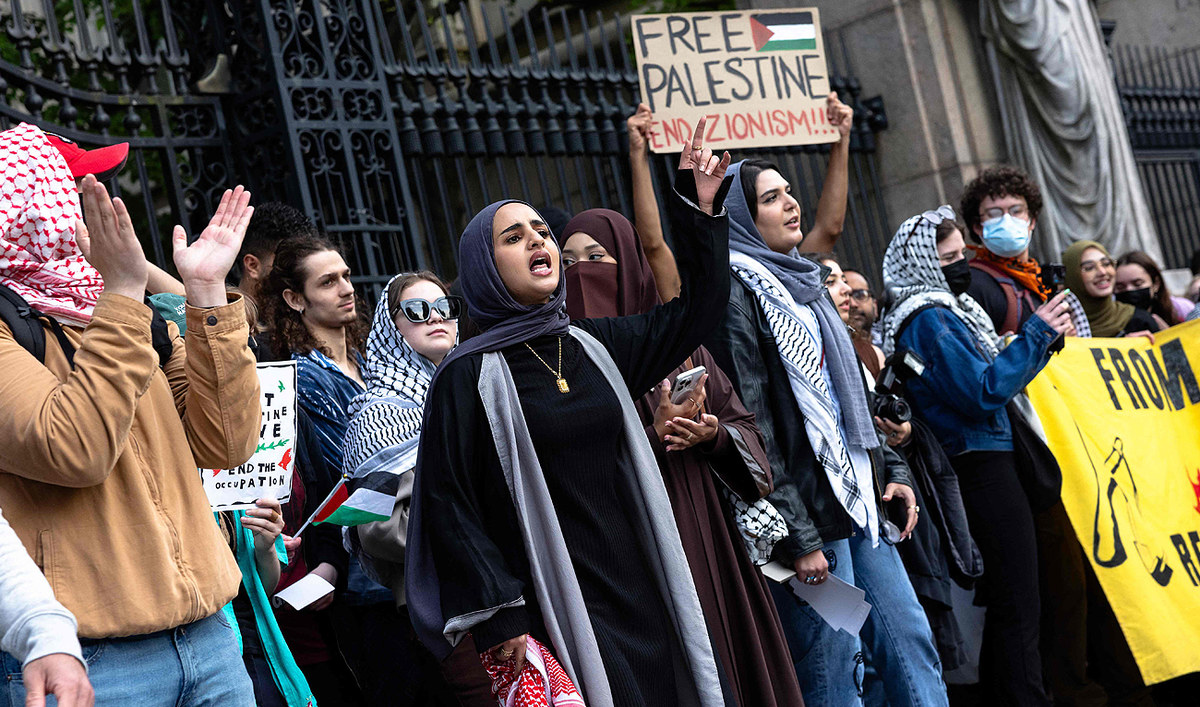
Though largely peaceful, at some locations the protests have been dispersed or dismantled by security forces. Hundreds of students and teachers have been arrested, some of whom face charges or academic sanctions.
Turk expressed concern that some of the responses by law enforcement authorities at several colleges might have been disproportionate, and called for such actions to be scrutinized to ensure they do not exceed what is necessary “to protect the rights and freedoms of others.”
He added that all such actions must be guided by human rights law, while “allowing vibrant debate and protecting safe spaces for all.”
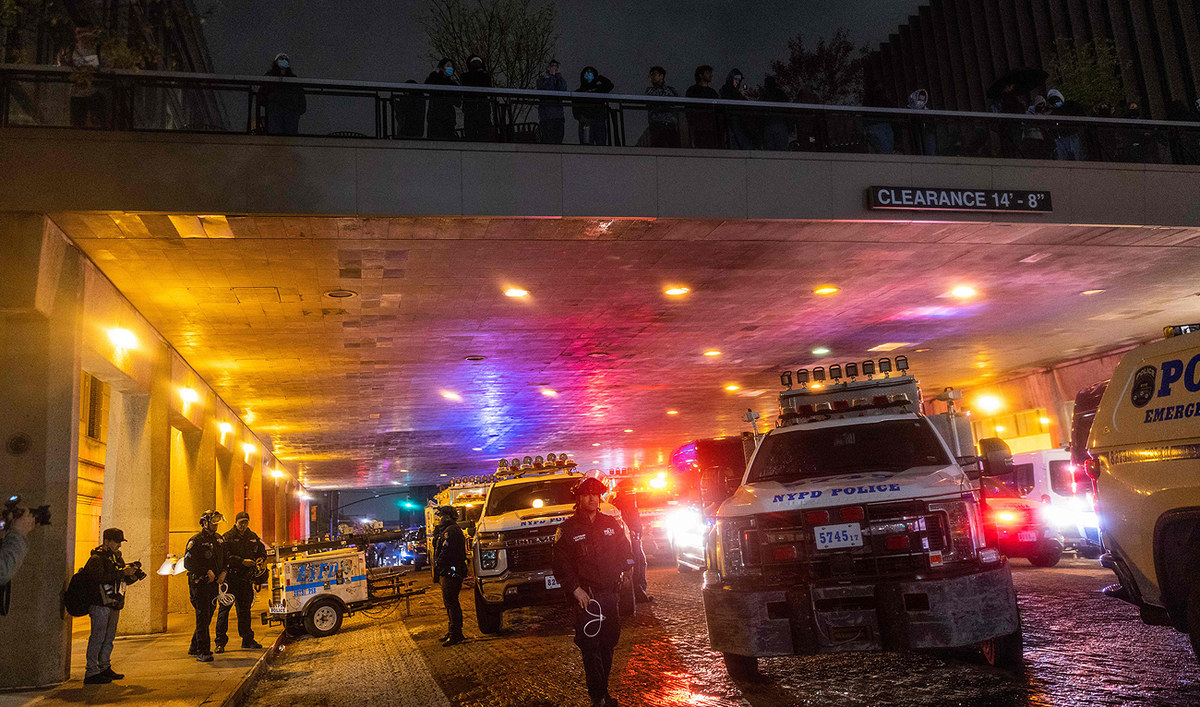
He reiterated that antisemitic, anti-Arab and anti-Palestinian activities and speech are “totally unacceptable, deeply disturbing (and) reprehensible.” However, the conduct of protesters must be assessed and addressed individually rather than through “sweeping measures that impute to all members of a protest the unacceptable viewpoints of a few,” Turk added.
“Incitement to violence or hatred on grounds of identity or viewpoints, whether real or assumed, must be strongly repudiated. We have already seen such dangerous rhetoric can quickly lead to real violence.”
Philippines says Chinese coast guard elevating tensions in South China Sea

- Philippine officials have said a coast guard ship and a fisheries vessel were damaged when Chinese coast guard vessels fired water cannons at them
- No country has sovereignty over Scarborough Shoal, a prime fishing patch close to major shipping lanes that is used by several countries
MANILA: The Philippines on Wednesday accused China’s coast guard of elevating tensions in the South China Sea after two vessels suffered damage from water cannon use by Beijing, an official said.
Philippine officials have said a coast guard ship and a fisheries vessel were damaged when Chinese coast guard vessels fired water cannons at them while on their way to the disputed Scarborough shoal on Tuesday to help Filipino fishermen at sea.
Commodore Jay Tarriela, Philippine coast guard spokesperson on South China Sea matters, said their Chinese counterparts have elevated tensions after it directly used water cannon against one of its vessels for the first time.
“It just goes to show that Goliath is becoming more Goliath. They don’t hesitate to use brute force to violate international law,” Tarriela told a briefing.
China has previously used water cannons against Philippine navy-crewed civilian supply vessels in the region.
No country has sovereignty over Scarborough Shoal, a prime fishing patch close to major shipping lanes that is used by several countries. The shoal falls inside the Philippines’ exclusive economic zone (EEZ) and has been a constant source of flashpoint between it and China.
Tarriela added China’s actions do not count as an armed attack against a Philippine vessel, but he said China has been raising the pressure of its water cannons which have damaged their ships.
The Philippines has a longstanding mutual defense treaty with the United States and Washington has pledged its “ironclad commitment” to defending its ally against an armed attack on Filipino military and public vessels, including coast guard ships, anywhere in the South China Sea.
A spokesperson at China’s embassy in Manila said Scarborough shoal, which it calls Huangyan Dao, “has always been China’s territory” and urged the Philippines to “stop making infringement and provocations at once and not to challenge China’s resolve to defend our sovereignty.”
China claims sovereignty over much of the South China Sea, a conduit for more than $3 trillion of annual ship-borne commerce, including parts claimed by the Philippines, Vietnam, Indonesia, Malaysia and Brunei.
An international tribunal in 2016 said China’s expansive claim had no legal basis, a decision Beijing has rejected.
Police arrest Columbia students, clear occupied building in campus unrest
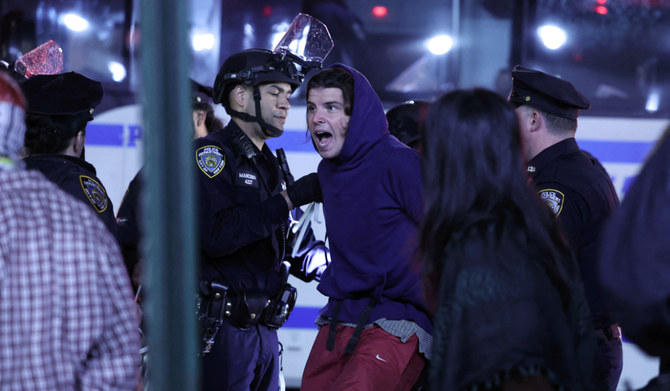
- Israel has killed more than 34,000 Palestinians, according to Gaza’s Health Ministry
- The protests have posed a challenge to university administrators trying to balance free speech rights with complaints that the rallies have veered into anti-Semitism and hate
New York: Dozens of helmeted police flooded Columbia University’s campus in the heart of New York City on Tuesday to evict a building occupied by pro-Palestinian student protesters and detain demonstrators.
Police climbed into Hamilton Hall via a second floor window they reached from a laddered truck, before leading handcuffed students out of the building into police vans.
The hall had been occupied at dawn by demonstrators who vowed they would fight any eviction, as they protested the soaring death toll from Israel’s war with Hamas in the Gaza Strip.
The action came as university administrators around the United States have struggled for weeks to contain pro-Palestinian demonstrations on dozens of campuses.
In a letter addressed to the New York Police department, Columbia University president Minouche Shafik said that the occupation of the school building was being led by “individuals who are not affiliated with the University” and asked “NYPD’s help to clear all individuals from Hamilton Hall and all campus encampments.”
She also asked the police to remain on campus through at least May 17, “to ensure encampments are not reestablished.”
Writing on Instagram, the protests slammed Shafik’s statement, saying “her use of the words ‘care’ and ‘safety’ are nothing short of horrifying.”
The weeks of demonstrations — the most sweeping and prolonged unrest to rock US college campuses since the Vietnam war protests of the 1960s and 70s — have already led to several hundred arrests of students and other activists.
Many of them have vowed to maintain their actions despite suspensions and threats of expulsion.
Earlier, protesters at Columbia were seen using ropes to hoist crates of supplies up to the building’s second floor, apparently signaling the students had planned to hunker down.
President Joe Biden’s White House had sharply criticized the seizure of Hamilton Hall, with a spokesman saying it was “absolutely the wrong approach.”
“That is not an example of peaceful protest,” the spokesman added.
The protests, with Columbia at their epicenter, have posed a challenge to university administrators trying to balance free speech rights with complaints that the rallies have veered into anti-Semitism and hate.
The unrest has swept through US higher education institutions like wildfire, with many student protesters erecting tent encampments on campuses from coast to coast.
At Columbia, demonstrators have vowed to remain until their demands are met, including that the school divest all financial holdings linked to Israel.
The university has rejected the demand. Columbia has warned that students occupying the building face expulsion.
In one of the newest clashes, at the University of North Carolina at Chapel Hill, police moved in Tuesday to clear one encampment, detaining some protesters in a tense showdown.
Meanwhile at northern California’s Cal Poly Humboldt, a week-long occupation was brought to a dramatic end early Tuesday when police moved in to arrest nearly three dozen protesters who had seized buildings and forced the closure of the campus.
In Oregon, Portland State University’s campus was closed Tuesday “due to an ongoing incident” in the library, college authorities said, after local media reported around 50 protesters had broken into the building a day earlier.
And Brown University reached an agreement in which student protesters will remove their encampment in exchange for the institution holding a vote on divesting from Israel — a major concession from an elite American university during the protests.
Footage of police in riot gear summoned at various colleges has been viewed around the world.
UN human rights chief Volker Turk voiced concern at the heavy-handed steps taken to disperse the campus protests, saying “freedom of expression and the right to peaceful assembly are fundamental to society.”
He added that “incitement to violence or hatred on grounds of identity or viewpoints — whether real or assumed — must be strongly repudiated.”
Shafik said many Jewish students had fled Columbia’s campus in fear. “Anti-Semitic language and actions are unacceptable,” she said.
The Gaza war started when Hamas militants staged an unprecedented attack on Israel on October 7 that left around 1,170 people dead, mostly civilians, according to an AFP tally of Israeli official figures.
During their attack, militants also seized hostages, 129 of whom Israel estimates remain in Gaza, including 34 whom the military says are dead.
Israel’s retaliatory offensive has killed at least 34,535 people in Gaza, mostly women and children, according to the Hamas-run territory’s health ministry.



